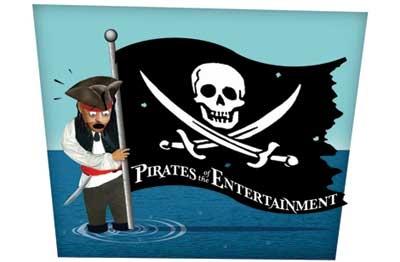Reality Bytes: Bringing Pirates to Bay

Parrots, hooks, peg legs, pieces of eight, the Spanish Main: Everybody loves pirates! Surely you know that September 19 is annual Talk Like a Pirate Day (I'm not making this up). Instead of your actual name, like "Kenneth" or "Colonel Sanders," wouldn't you prefer to be called "Cap'n Slappy"? Everybody loves pirates.
| 'Zat You, Zune? |
| Q. What is Zune? A. Zune is Microsoft's brand-new portable music-and-movie player. And here's what it looks like . . . Q. Will the Zune kill the iPod? A. No, it will not. The iPod is a machine, not a living being; thus, it cannot be killed. Q. Will the Zune suck? A. Not totally. In fact, it's technologically endowed with a king-size screen (for a portable) and some cool features. Q. Is the Zune creepy? A. You bet. It lets you wirelessly share songs (playable three times over 3 days) with other nearby Zunesters. But not only that, others can see the most intimate (and potentially most embarrassing) secret in your life: your entire playlist. Even worse, when you're on the train late at night, you might accidentally see the playlist of the scary troubled loner guy sitting across the aisle - as he Wi-Fi flashes you. That is creepy, and just wrong. |
Honest folks (landlubbers, mainly) have legally downloaded 2 billion songs at 99¢ each. (88¢ at Wal-Mart. Always low prices. Always.) They support the growing legal downloading industry. But for every legal song, I bet there are 50 illegal downloads. It's been estimated that sites like BitTorrent, a popular source of questionable IP, account for a third of all Internet traffic. Piracy continues to shiver the timbers of IP people. But times are changing, and the Jolly Roger may be sinking.
Case in point: Windows XP turned a fairly blind eye to pirating. But Vista won't. After you install a new copy, you'll be advised to activate it. If you don't within 30 days, Vista will switch to a "reduced functionality mode," and features will be disabled. For example, the Web browser will operate for only an hour at a time. After you've legitimately activated a copy, you'll be checked again when downloading additional Microsoft products. If Vista smells a pirate, you'll get another 30-day grace period before features are disabled. Even worse, a screen message will appear, advising that "This copy of Windows is not genuine." The world's largest software company vows that all future products will be similarly tough. That's more than a warning shot across the bow of piracy. A third of the software installed on computers worldwide is "nongenuine" - and Microsoft wants its due.
Inevitably, the same screws will be tightened on pirated music and movies. As our computers become ever more integrated, it will be increasingly easy for anyone to check your hard disk's contents. Surely, companies will devise ways to deep-six ill-gotten data. Or someday, in the same way that the government will turn off all analog TV broadcasting, it may throw some kill switch and send all illegal copies of "Stairway to Heaven" to Davy Jones's locker. If you're an honest citizen, the kill switch won't affect you. You might even welcome it. Remember that ratio of 50 illegal songs (all free) for every legal one (at 99¢)? Well, in comparison, if pirates paid for each song, record labels would end up making more money by selling 51 songs at 2¢ each. I'm not holding my breath for 2¢ downloads, but reducing piracy might lower your downloading costs.
All scallywags and rascals - as well as anyone who resents government and corporate interference in their personal affairs - will resist these measures with Linux and file-sharing and every other countermeasure. Still, it's clear that a crackdown is coming. Ahoy, Cap'n Slappy! Prepare to be boarded!




























































